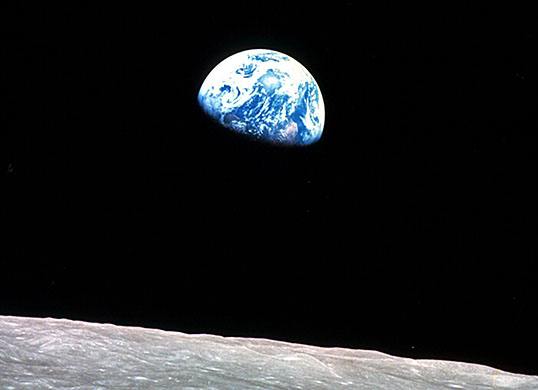
Back in the days of Tim Leary, Bucky Fuller, Abbie Hoffman, and Jefferson Airplane, conversations veered into talk about consciousness, raised and otherwise. In the mind-expanding 60s and 70s it seemed as if humanity had finally woken up, had come to understand the precariousness and preciousness of existence and moved beyond petty fixations upon wealth, ethnicity and nationality. It was, some declared, the Dawning of the Age of Aquarius.
This was not the case, unfortunately. It’s not that the revelations of so many of us were wrong; quite the contrary, the photos of our small blue planet hanging in the lonely blackness of space were indeed a wake-up call. The fate of humanity and all life on earth seemed in the balance; it was true then, and is still true today. What Tim, Bucky, Abbie and the rest of us underestimated, however, was the inertia and momentum of an industrial system of thought that had turned our planet and everyone on board into things. On the heels of centuries of religious ideology, we’d created not the Kingdom of God, but the Thingdom of Man.
Making distinctions is what allows animal life to fundamentally sort out the world, determining what should be eaten and what should not, what conditions present a danger and what is safe. For countless eons all animals had to do was to make distinctions. The self-consciousness and self-identity of human ego is not essential in making distinctions, but once present provides a chronologically continuous framework for a narrative that creates what we commonly refer to as reality, the reality of self and other, the reality of Thingdom.
This was the realization – the great awakening – of the 60s. Our growing awareness of the ways in which we and the world had been transformed by Thingdom’s instruments of utility stimulated an intellectual revolution. Post-modernists such as Jacques Derrida and Michel Foucault described the ways in which we had constructed Thingdom and effectively pulled the carpet out from under commonly shared conceptions of truth. Albert Einstein had played the same trick with physics earlier in the 20th century, upending the common-sense predictability of Newton’s apple and sending humanity hurtling into the uncertain relativity of time and space. These wake-up calls did indeed get attention, but not in the ways we might have expected. Rather than unshackling us, they generated a new age of confusion. Each time we’ve thought we’ve fully awakened, it turns out we’ve just semi-woke.
Being “woke” today is something different, yet again. The relativistic impulse of post-modernism combined with the interconnectedness of digital communications technology has thrust humanity into a tribalistic post-truth era. Foucault described Thingdom when he warned us that humanity was devolving into little more than “calculable units,” and Derrida’s deconstructionism created a universe of alternate facts. The rise of identity politics – black, white, brown, gay, straight, non-gendered, and awareness of their related macro- and micro-aggressions – accompanies a resurgent populist nationalism altogether too reminiscent of the Fascistogenic conditions of Europe in the early 20th century.
Meanwhile, ninety-three year old naturalist Sir David Attenborough, with his eye still on our tiny blue ball hanging in empty space, cautions that unless civilization changes course immediately, life as we know it on our planet is doomed, and humanity along with it. We’re facing extinction. It doesn’t get any more woke than that.
so how did “woke” become an adjective? this toying with language is itself a symptom of the issue you describe.